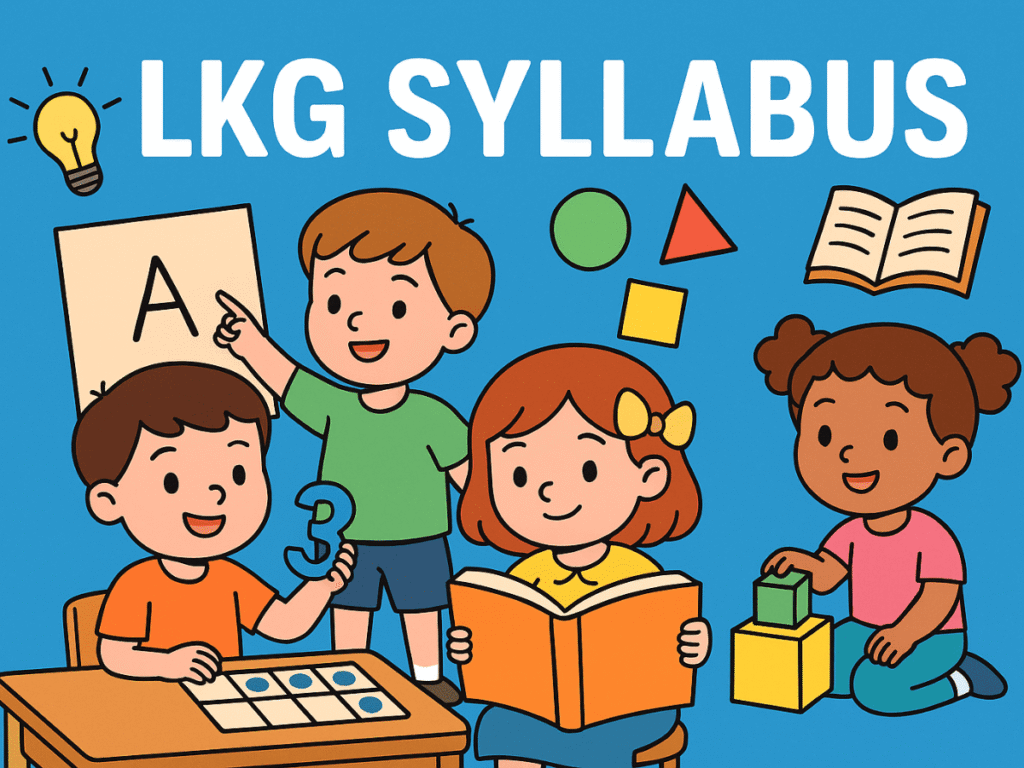Explore the complete CBSE LKG syllabus for 2025 covering Mathematics, English, General Awareness, and Environmental Science. Get detailed topics, learning objectives, and FAQs for a strong foundation in early education.
Nursery Class Syllabus 2025 – 2026

Starting formal education is a big step for any child. The Lower Kindergarten (LKG) class lays the foundation for a child’s learning journey by introducing essential skills in a fun and engaging way. The CBSE syllabus for LKG is carefully designed to promote cognitive, physical, emotional, and social development.
Overview of the LKG Syllabus
The LKG curriculum mainly includes the following subjects:
- Mathematics
- English
- General Awareness
- Environmental Science (EVS)
Each subject focuses on age-appropriate concepts that build basic skills such as counting, letter recognition, general knowledge, and good habits.
LKG Mathematics Syllabus
Mathematics for LKG children is all about exploring numbers, shapes, sizes, and basic comparisons through interactive activities. The focus is on understanding numbers up to 10 and recognizing common shapes.
Key Topics in LKG Maths
1. Shapes
- Recognize and name circles, squares, triangles, and rectangles.
- Identify shapes in the environment and differentiate between them.
2. Counting Numbers
- Count objects, dots, and shapes from 1 to 3, then 1 to 5, and finally 1 to 10.
- Use ten frames to visualize numbers.
- Represent numbers using drawings or physical objects.
3. Comparing Quantities
- Understand concepts like “more,” “less,” and “enough.”
- Compare groups of objects to determine which has more or fewer items.
4. Positions and Directions
- Learn spatial concepts: inside/outside, above/below, beside/next to, left/right, top/middle/bottom.
5. Classification
- Group objects by color, shape, or size.
- Identify similarities and differences.
6. Sizes and Measurements
- Understand terms like long/short, tall/short, heavy/light, wide/narrow.
7. Money
- Introduction to coins, especially 1-rupee coins.
- Count simple coins to build familiarity with money.
LKG English Syllabus
The English curriculum aims to build early literacy skills through letter recognition, phonics, and simple vocabulary.
Key Topics in LKG English
1. Pre-writing Strokes
- Practice basic strokes essential for writing letters, such as standing lines, sleeping lines, curves, and slants.
2. Alphabets
- Recognize and write capital letters (A-Z) and small letters (a-z).
- Match capital and small letters.
- Associate letters with objects (e.g., A for Apple).
3. Phonics and Sounds
- Learn the sounds of vowels and consonants.
- Practice phonics drills to improve pronunciation.
- Identify rhyming words to enhance listening skills.
4. Vocabulary and Grammar
- Use simple words, including vowel words.
- Understand basic grammar concepts such as articles (a, an) and singular/plural (one-many).
- Learn positional words (this, that, these, those).
5. Communication Skills
- Encourage oral interaction through storytelling, flashcards, and role play.
- Practice listening and speaking in a fun, interactive environment.
LKG General Awareness Syllabus
General Awareness introduces children to themselves, their surroundings, and important social concepts to build confidence and understanding of the world.
Key Topics in General Awareness
1. About Myself
- Understand body parts and their functions.
- Talk about family members.
- Discuss personal milestones like birthdays.
2. Safety
- Learn safety rules at home, on the road, and in playgrounds.
- Understand the importance of being careful and responsible.
3. People Who Help Us
- Identify helpers in the community such as doctors, teachers, policemen, postmen, farmers, and carpenters.
4. Transport
- Learn about different modes of transport: road, rail, and air.
5. Seasons
- Recognize seasonal changes: summer, winter, and rainy seasons.
6. Animals
- Differentiate between wild, domestic, water, and pet animals.
LKG Environmental Science (EVS) Syllabus
EVS teaches children about nature, good habits, and basic safety to develop awareness and responsibility.
Key Topics in LKG EVS
- Good habits and manners.
- Projects like collecting and identifying living and non-living things.
- Introduction to traffic rules and road safety.
- Detailed study of body parts and their uses.
Conclusion
The LKG syllabus under CBSE is designed to make learning an enjoyable and interactive experience for young learners. It balances cognitive development with social and emotional skills, ensuring children are well-prepared for further education. Parents and teachers should focus on making lessons playful and engaging to nurture curiosity and creativity in children.
Frequently Asked Questions (FAQs)
-
What is the LKG syllabus?
The LKG syllabus includes basic subjects like Mathematics, English, General Awareness, and Environmental Science. It focuses on foundational skills such as counting, letter recognition, safety, and good habits.
-
What is the syllabus of the LKG class in CBSE?
CBSE’s LKG syllabus covers counting numbers up to 10, identifying shapes, alphabets with phonics, general knowledge about self and surroundings, and basic environmental science topics.
-
What are the major subjects taught in LKG?
The main subjects are Mathematics, English, General Awareness, and Environmental Science.
-
What is the syllabus for LKG in India?
Across India, the LKG syllabus typically includes foundational mathematics, English alphabets, basic general knowledge, safety rules, and environmental awareness. CBSE follows a structured curriculum covering these topics.
-
How is English taught in LKG?
English in LKG focuses on pre-writing strokes, recognizing capital and small letters, phonics, vocabulary, rhyming words, and simple grammar concepts through oral and written activities.
-
What kind of Maths topics are included in LKG?
Counting numbers up to 10, identifying shapes, comparing quantities, understanding positions, classifying objects by shape and color, and an introduction to money.
-
Is the LKG syllabus the same for all schools?
While most CBSE schools follow a similar syllabus, there might be slight variations depending on the school’s teaching methods and additional activities.